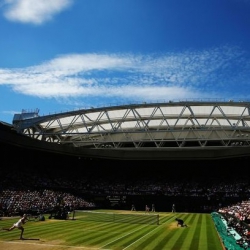
Tennis’s top officials appear to be cleaning up the lower ranks, but questions remain about players ranked in the Top 100.
A potential gambling scandal continues to bubble under the surface of the pro tennis circuit. The latest allegations are against six little-known tennis umpires, including a lifetime ban of one official and a 12-month suspension for another. Also, it was announced last week that 350 tennis players have been banned by the bookmakers.
The revelations come after several weeks of speculation about corruption among professional tennis players. At the start of the Australian Open in mid-January, BBC and Buzzfeed released a story about longstanding corruption in the game. The article focused on the ATP’s and Tennis Integrity Unit’s unwillingness to sanction players.
2007 Tennis Integrity Unit Investigations
Going back to a 2007 investigation in a match involving then-world #4 player Nikolai Davydenko, the BBC reported the Tennis Integrity Unit had uncovered a match-fixing ring, but did little to stop it. This ring was centered in Russia, Ukraine, and Northern Italy, and several investigators told BBC and Buzzfeed that the ring had ties to players. Information in the last week indicates corruption among tennis umpires, who appear to have ties to match fixers in the same general regions.
Most of those players are little-known players on the fringes of the sport. The revelation came after it was revealed that a mixed doubles match between obscure players had a large amount of money wagered on it. The matched pitted Andrea Hlavackova of Czech Republic and Lukasz Kubot of Poland against the Spainish pair of Lara Arruabarrena and David Marrero. Marrero was questioned by media regarding his role in the match.
6 Tennis Umpires Investigated
The latest starting news is official notification that 6 different tennis umpires were involved in gambling. It is not yet know what forms of gambling each was involved in, but the reaction of the governing bodies gives some indication.
One of the officials was banned for life. One of the officials was banned for 12 months. The other four officials might have been sanctioned, but they were not suspended. That indicates three levels of suspected infraction. Certain forms of gambling are worse than others. For instance, gambling on football or basketball might be frowned upon, but it hardly affects the outcome of tennis matches.
Betting on tennis would be particularly hard to justify, but so long as the betting was on something an official had no impact on, it still does not rise to the level of a lifetime ban (perhaps). Betting on a match in which one referees would be a clear violation.
Guardian Report on Banned Officials
The Guardian reported that the banned officials are from Ukraine, Croatia, France, Turkey, and Kazakhstan. The official banned for life was Kirill Parfenov of Kazakhstan. Denis Pitner, an official from Croatia, has been suspended for 12 months.
A third official, Morgan Lamri of France, also was been banned for life. Lamri’s case was previously known, so his ban was not a part of the recent revelations. Morgan Lamri was a minor league player and sometime tennis referee who made friends with some of the players. He later used inside information to gamble, and was suspended. His lifetime ban has been expected for some time.
BBC Report on Earlier Match-Fixing Probes
It is the actions (or inaction) at the Tennis Integrity Unit and the ATP which is the real story in these scandals. According to the BBC, 15 players are on a Tennis Integrity Unit watchlist, but are still allowed to play. The BBC estimated that between 8 and 27 pro-level players are considered to have suspicious ties, yet allowed to continue playing.
BBC and Buzzfeed later wrote that 8 players who were investigated for suspicious activity in 2007 and 2008 were allowed to enter the 2016 Australian Open. The BBC said it had the names of those players, but would not release them, because it did not have the police powers to authenticate that information. Without the ability to see the players’ phone, computer, and bank records, they could not verify the charges.
Tennis Association’s Anti-Corruption Actions
The ATP might be taking the measures to clean out the sport that are being called for. Getting rid of corrupt officials is a start. Blacklisting 350 players is also helpful, if they are suspected of wrongdoing. But this is cleaning out the bottom rungs of the sport.
Too often in the past, the ATP and WTA have looked the other way with top-ranked players, because they are the sport’s cash cows. Often, this is minor stuff, such as the outrageous noises made by certain players when they hit the ball. Rules were made to eliminate such distractions, but top players were grandfathered into the rules — an outrageous and unfair decision.
It is a different matter when the players are allowed to have suspicious ties to notorious match-fixers. Allowing distractions on the court might annoy some viewers, and even drive a few of them away. Allowing match-fixing to go on unimpeded could rock the sport to its foundations — or even destroy its international marketability.
